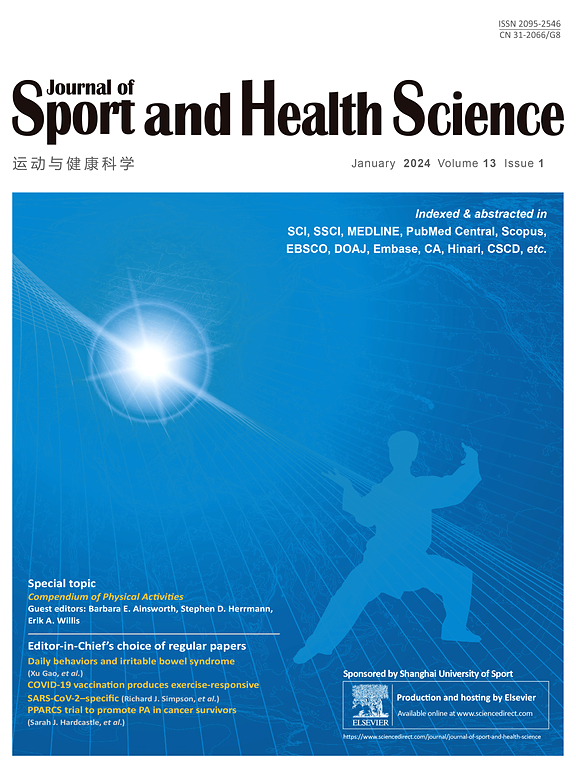促进老年人体育活动的人工智能社交机器人:系统综述。
IF 10.3
1区 医学
Q1 HOSPITALITY, LEISURE, SPORT & TOURISM
引用次数: 0
摘要
背景全球人口老龄化需要创新战略来提高老年人的健康和生活质量。体育活动(PA)对于健康的老龄化至关重要,然而许多老年人很难有规律地锻炼。人工智能(AI)驱动的社交机器人提供了一种互动的、引人入胜的和个性化的解决方案,以促进这一人群中的PA。本系统综述调查了人工智能驱动的社交机器人在鼓励老年人PA中的作用。方法系统检索PubMed、IEEE Xplore、Scopus、Cochrane Library、Web of Science等数据库,检索截止到2024年2月发表的研究。我们收录了同行评议的文章,报告了设计、实施和评估人工智能社交机器人以促进老年人PA的实证研究结果。研究在疗养院、康复中心、社区中心和家庭环境中进行。结果共纳入19项研究。分析显示,人工智能社交机器人有效地激励老年人参与体育锻炼,从而增加了锻炼的依从性,提高了参与度,延长了训练时间。社交机器人已经在各种环境中证明了有效性,包括养老院、康复中心、社区中心、家庭环境和老年人护理设施。在养老院和康复中心这样的结构化环境中,机器人可以帮助维持定期的锻炼,提高依从性和康复效果。在社区和老年人护理中心,机器人通过促进小组练习和提高参与度来促进PA和社会参与。在家庭环境中,机器人为日常活动提供个性化的支持,提供提醒和参与,从而促进长期的活动参与。用户的接受度和满意度很高,参与者认为机器人很吸引人,很有趣。此外,几项研究表明了潜在的健康益处,如改善药物依从性,改善睡眠模式,增强整体幸福感。然而,需要进一步的研究来解决尚未解决的问题,如技术维护成本、设计限制以及人工智能社交机器人对特定用户群体的适应性。结论人工智能社交机器人在促进老年人PA,增强他们的健康,福祉和独立性方面发挥着有希望的作用。这篇综述为研究人员、设计师和医疗保健专业人员为老年人开发支持人工智能的社交机器人系统提供了见解。本文章由计算机程序翻译,如有差异,请以英文原文为准。
Artificial intelligence-powered social robots for promoting physical activity in older adults: A systematic review.
BACKGROUND
The aging global population necessitates innovative strategies to enhance older adults' health and quality of life. Physical activity (PA) is crucial for healthy aging, yet many older adults struggle to exercise regularly. Artificial intelligence (AI)-powered social robots offer an interactive, engaging, and personalized solution to promote PA among this demographic. This systematic review investigates the role of AI-powered social robots in encouraging PA in older adults.
METHODS
We conducted a systematic literature search in databases including PubMed, IEEE Xplore, Scopus, Cochrane Library, and Web of Science, focusing on studies published until February 2024. We included peer-reviewed articles reporting empirical findings on designing, implementing, and evaluating AI-enabled social robots to promote PA among older adults. Studies were conducted in nursing homes, rehabilitation centers, community centers, and home environments.
RESULTS
A total of 19 studies were included in the review. Analysis reveals that AI-powered social robots effectively motivate older adults to engage in PAs, leading to increased exercise adherence, higher engagement levels, and extended training durations. Social robots have demonstrated effectiveness across various environments, including nursing homes, rehabilitation centers, community centers, home environments, and elder care facilities. In structured environments like nursing homes and rehabilitation centers, robots help maintain regular exercise routines, improving adherence and recovery outcomes. In community and elder care centers, robots promote PA and social engagement by facilitating group exercises and enhancing participation. In home environments, robots provide personalized support for daily activities, offering reminders and engagement, which fosters long-term activity engagement. User acceptance and satisfaction are high, with participants finding the robots engaging and enjoyable. Additionally, several studies indicate potential health benefits, such as improved medication adherence, better sleep patterns, and enhanced overall well-being. Nevertheless, additional research is imperative to address unresolved issues concerning the technological maintenance costs, design constraints, and adaptability of AI-powered social robots to specific user demographics.
CONCLUSION
AI-powered social robots play a promising role in promoting PA among older adults, enhancing their health, well-being, and independence. This review provides insights for researchers, designers, and healthcare professionals developing AI-enabled social robotic systems for older adults.
求助全文
通过发布文献求助,成功后即可免费获取论文全文。
去求助
来源期刊

Journal of Sport and Health Science
SPORT SCIENCES-
CiteScore
18.30
自引率
1.70%
发文量
101
审稿时长
22 weeks
期刊介绍:
The Journal of Sport and Health Science (JSHS) is an international, multidisciplinary journal that aims to advance the fields of sport, exercise, physical activity, and health sciences. Published by Elsevier B.V. on behalf of Shanghai University of Sport, JSHS is dedicated to promoting original and impactful research, as well as topical reviews, editorials, opinions, and commentary papers.
With a focus on physical and mental health, injury and disease prevention, traditional Chinese exercise, and human performance, JSHS offers a platform for scholars and researchers to share their findings and contribute to the advancement of these fields. Our journal is peer-reviewed, ensuring that all published works meet the highest academic standards.
Supported by a carefully selected international editorial board, JSHS upholds impeccable integrity and provides an efficient publication platform. We invite submissions from scholars and researchers worldwide, and we are committed to disseminating insightful and influential research in the field of sport and health science.
 求助内容:
求助内容: 应助结果提醒方式:
应助结果提醒方式:


